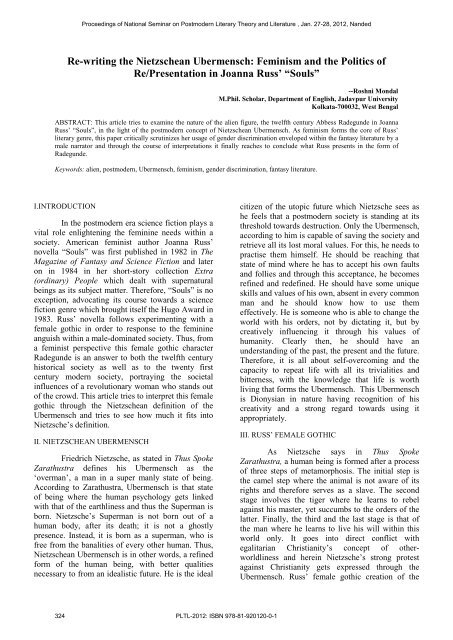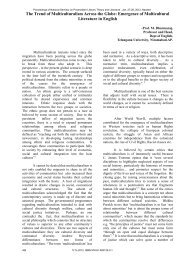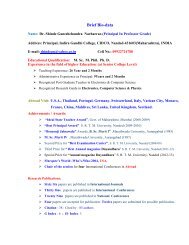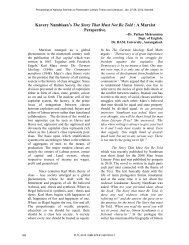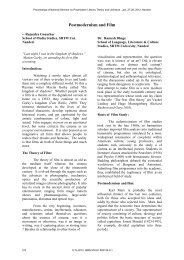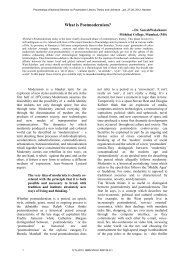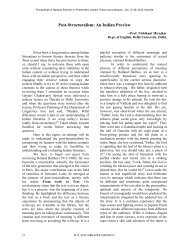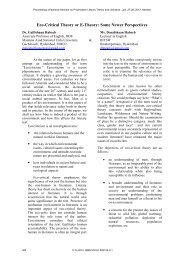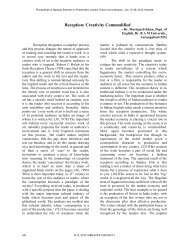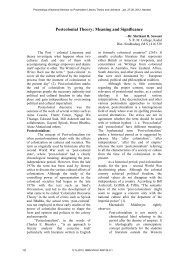Postcolonial Feminist Theory: An Overview - Igcollege.org
Postcolonial Feminist Theory: An Overview - Igcollege.org
Postcolonial Feminist Theory: An Overview - Igcollege.org
Create successful ePaper yourself
Turn your PDF publications into a flip-book with our unique Google optimized e-Paper software.
Proceedings of National Seminar on Postmodern Literary <strong>Theory</strong> and Literature , Jan. 27-28, 2012, NandedRe-writing the Nietzschean Ubermensch: Feminism and the Politics ofRe/Presentation in Joanna Russ’ “Souls”--Roshni MondalM.Phil. Scholar, Department of English, Jadavpur UniversityKolkata-700032, West BengalABSTRACT: This article tries to examine the nature of the alien figure, the twelfth century Abbess Radegunde in JoannaRuss’ “Souls”, in the light of the postmodern concept of Nietzschean Ubermensch. As feminism forms the core of Russ’literary genre, this paper critically scrutinizes her usage of gender discrimination enveloped within the fantasy literature by amale narrator and through the course of interpretations it finally reaches to conclude what Russ presents in the form ofRadegunde.Keywords: alien, postmodern, Ubermensch, feminism, gender discrimination, fantasy literature.I.INTRODUCTIONIn the postmodern era science fiction plays avital role enlightening the feminine needs within asociety. American feminist author Joanna Russ’novella “Souls” was first published in 1982 in TheMagazine of Fantasy and Science Fiction and lateron in 1984 in her short-story collection Extra(ordinary) People which dealt with supernaturalbeings as its subject matter. Therefore, “Souls” is noexception, advocating its course towards a sciencefiction genre which brought itself the Hugo Award in1983. Russ’ novella follows experimenting with afemale gothic in order to response to the feminineanguish within a male-dominated society. Thus, froma feminist perspective this female gothic characterRadegunde is an answer to both the twelfth centuryhistorical society as well as to the twenty firstcentury modern society, portraying the societalinfluences of a revolutionary woman who stands outof the crowd. This article tries to interpret this femalegothic through the Nietzschean definition of theUbermensch and tries to see how much it fits intoNietzsche’s definition.II. NIETZSCHEAN UBERMENSCHFriedrich Nietzsche, as stated in Thus SpokeZarathustra defines his Ubermensch as the‘overman’, a man in a super manly state of being.According to Zarathustra, Ubermensch is that stateof being where the human psychology gets linkedwith that of the earthliness and thus the Superman isborn. Nietzsche’s Superman is not born out of ahuman body, after its death; it is not a ghostlypresence. Instead, it is born as a superman, who isfree from the banalities of every other human. Thus,Nietzschean Ubermensch is in other words, a refinedform of the human being, with better qualitiesnecessary to from an idealistic future. He is the idealcitizen of the utopic future which Nietzsche sees ashe feels that a postmodern society is standing at itsthreshold towards destruction. Only the Ubermensch,according to him is capable of saving the society andretrieve all its lost moral values. For this, he needs topractise them himself. He should be reaching thatstate of mind where he has to accept his own faultsand follies and through this acceptance, he becomesrefined and redefined. He should have some uniqueskills and values of his own, absent in every commonman and he should know how to use themeffectively. He is someone who is able to change theworld with his orders, not by dictating it, but bycreatively influencing it through his values ofhumanity. Clearly then, he should have anunderstanding of the past, the present and the future.Therefore, it is all about self-overcoming and thecapacity to repeat life with all its trivialities andbitterness, with the knowledge that life is worthliving that forms the Ubermensch. This Ubermenschis Dionysian in nature having recognition of hiscreativity and a strong regard towards using itappropriately.III. RUSS’ FEMALE GOTHICAs Nietzsche says in Thus SpokeZarathustra, a human being is formed after a processof three steps of metamorphosis. The initial step isthe camel step where the animal is not aware of itsrights and therefore serves as a slave. The secondstage involves the tiger where he learns to rebelagainst his master, yet succumbs to the orders of thelatter. Finally, the third and the last stage is that ofthe man where he learns to live his will within thisworld only. It goes into direct conflict withegalitarian Christianity’s concept of otherworldlinessand herein Nietzsche’s strong protestagainst Christianity gets expressed through theUbermensch. Russ’ female gothic creation of the324 PLTL-2012: ISBN 978-81-920120-0-1


